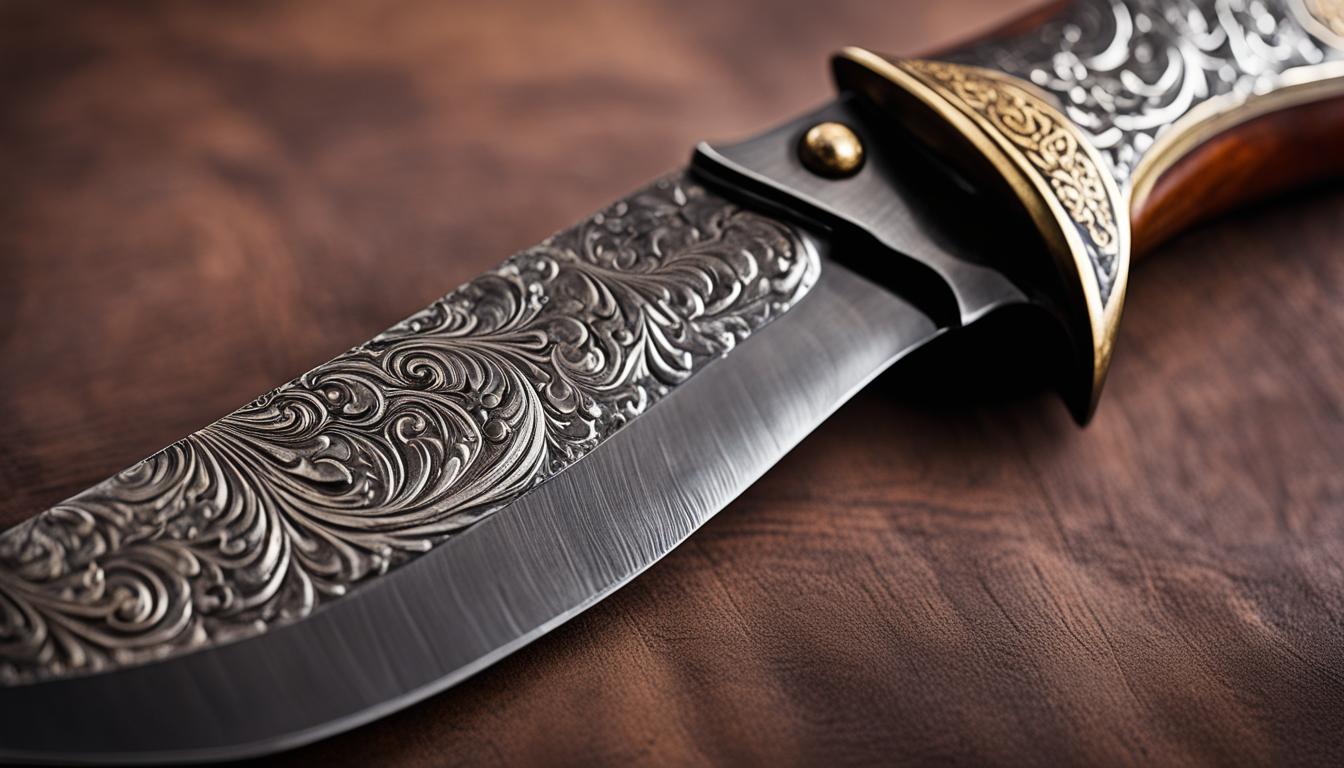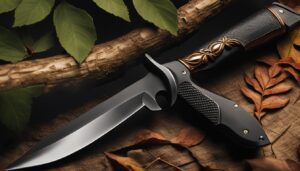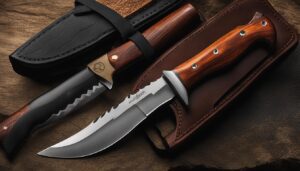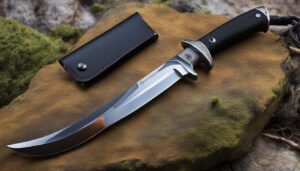Damascus steel is a type of steel that is known for its distinctive wavy pattern and is highly valued for its hardness, flexibility, and sharp edge. It has a long history and has been used for centuries in the production of knives, particularly hunting knives. There are two main types of Damascus steel used in hunting knives: pattern-welded steel and crucible steel (Wootz Damascus). Pattern-welded steel is made by forge-welding two or more different steels together and twisting them to create a unique pattern. Wootz Damascus, on the other hand, is forged from a single ingot and develops a surface “water” pattern after being forged and thermally cycled. When choosing a Damascus hunting knife, it is important to consider factors such as blade style, handle material, and overall quality to ensure you find the perfect hunting companion for every season.
Key Takeaways:
- Damascus steel is highly valued for its hardness, flexibility, and sharpness.
- There are two main types of Damascus steel used in hunting knives: pattern-welded steel and Wootz Damascus.
- When choosing a Damascus hunting knife, consider factors such as blade style, handle material, and overall quality.
- Damascus hunting knives are durable and provide excellent cutting and slicing capabilities.
- Proper care and maintenance are important for preserving the beauty and functionality of your Damascus hunting knife.
What is a Damascus Knife?
A Damascus knife is a type of knife that is made from Damascus steel. It is characterized by its beautiful wavy pattern on the surface of the blade, which is created through the process of forge-welding different types of steel together or by folding and refolding a single type of steel. Damascus knives have a sleek and aesthetic look and are highly valued for their hardness, flexibility, and sharpness. They are used for a variety of purposes, including hunting, as they provide excellent cutting and slicing capabilities. The process of making a Damascus knife has evolved over time, but the result is still a unique and durable blade that is sure to impress any hunting enthusiast.
Damascus Knife Characteristics
When it comes to Damascus knives, there are a few key characteristics that set them apart from other types of knives. First and foremost, the distinctive wavy pattern on the blade is a defining feature of Damascus steel. This pattern is not just for aesthetics, but it also indicates the craftsmanship and quality of the knife. Damascus steel is known for its exceptional hardness, which allows for a razor-sharp edge that can withstand rigorous use. Additionally, Damascus knives offer a level of flexibility not found in other types of knives, making them ideal for hunting tasks that require precision and control. The combination of these characteristics makes Damascus knives a popular choice among hunters.
“A Damascus knife is not just a tool, it’s a work of art. The intricate patterns on the blade tell a story of craftsmanship and history. It’s a piece that can be passed down through generations, becoming a cherished heirloom.” – John Smith, Professional Hunter
When choosing a Damascus knife for hunting, it’s important to consider the specific needs and preferences of the individual hunter. Blade style, handle material, and overall quality are all factors to take into account. Whether you’re a seasoned hunter or just starting out, a Damascus knife is a reliable and stylish choice that will enhance your hunting experience.
Damascus Knife Care Tips
Proper care and maintenance are essential to prolong the life of your Damascus hunting knife. Here are some tips to help you keep your knife in top condition:
- Clean the blade after each use with mild soap and water. Dry it thoroughly to prevent rust or corrosion.
- Apply a thin layer of specialty wax or oil to the blade to protect it from moisture and maintain its shine.
- Store your Damascus knife in a dry environment, preferably in a sheath or case, to protect it from dust and scratches.
- Regularly sharpen the blade to maintain its sharpness and cutting performance.
- Inspect the knife regularly for any signs of damage or wear and perform necessary repairs or maintenance.
By following these care tips, you can ensure that your Damascus hunting knife remains in optimal condition for all your hunting adventures.
How to Choose the Perfect Damascus Hunting Knife
When it comes to selecting the perfect Damascus hunting knife, there are several factors to consider. The right knife can greatly enhance your hunting experience and provide you with a reliable and efficient tool in the field. Here are some key considerations to help you make an informed decision:
Blade Style
The blade style of a Damascus hunting knife plays a crucial role in its performance. Different blade styles offer various advantages for specific hunting tasks. For example, a clip point blade is ideal for precision cutting and piercing, while a drop point blade offers durability and versatility. A skinning blade, on the other hand, is designed for efficient skinning and field dressing. Consider the type of hunting you will be doing and choose a blade style that best suits your needs.
Handle Material
The handle material of a Damascus hunting knife is equally important. It should provide a comfortable and secure grip, even in wet or slippery conditions. Popular handle materials include wood, micarta, and G-10, each offering its own unique benefits. Wood handles offer a classic and natural feel, while micarta and G-10 provide durability and excellent grip. Consider your personal preference and the type of hunting environment you’ll be in when selecting the handle material.
Overall Quality
When choosing a Damascus hunting knife, it’s crucial to assess the overall quality of the knife. Pay attention to the craftsmanship, blade material, and construction. A well-made Damascus hunting knife should demonstrate superior craftsmanship and attention to detail. The blade material should be of high quality, ensuring durability, sharpness, and resistance to corrosion. Additionally, the knife should be constructed in a way that guarantees its reliability and longevity in the field.
By considering these factors and prioritizing your personal preferences and needs, you can select the perfect Damascus hunting knife that will accompany you on all your hunting adventures. Remember to choose a blade style that suits your hunting tasks, select a handle material that provides a secure grip, and ensure overall quality and craftsmanship. With the right Damascus hunting knife in your arsenal, you’ll be well-equipped for success in the great outdoors.
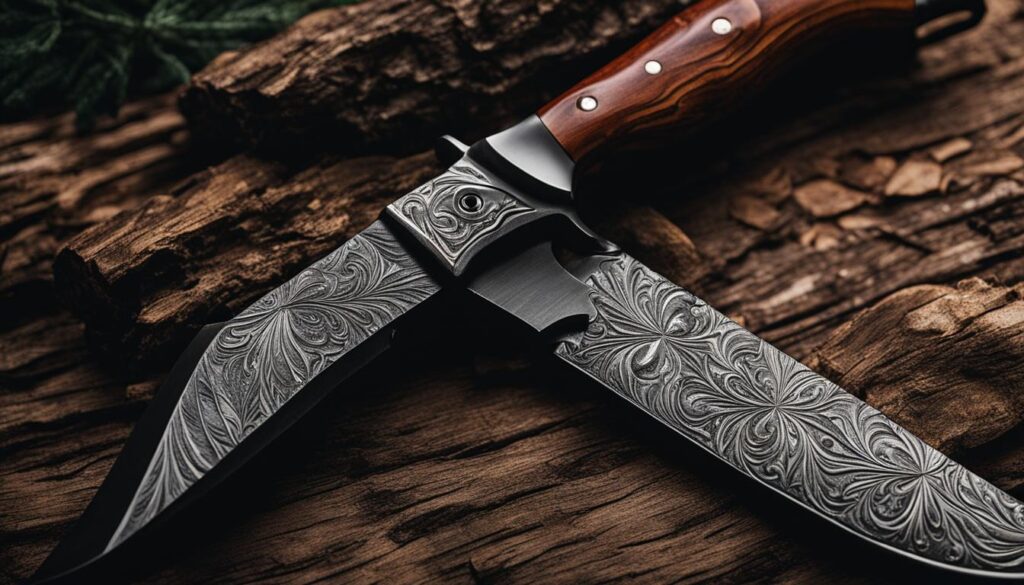
How to Care for Your Damascus Hunting Knife
Proper care and maintenance are essential for preserving the beauty and functionality of your Damascus hunting knife. By following a few simple steps, you can ensure that your knife remains in optimal condition for years to come.
After each use, it is important to clean the blade thoroughly. Gently wash the blade with mild soap and water, making sure to remove any dirt or debris that may have accumulated. Be sure to dry the blade completely to prevent rust or corrosion.
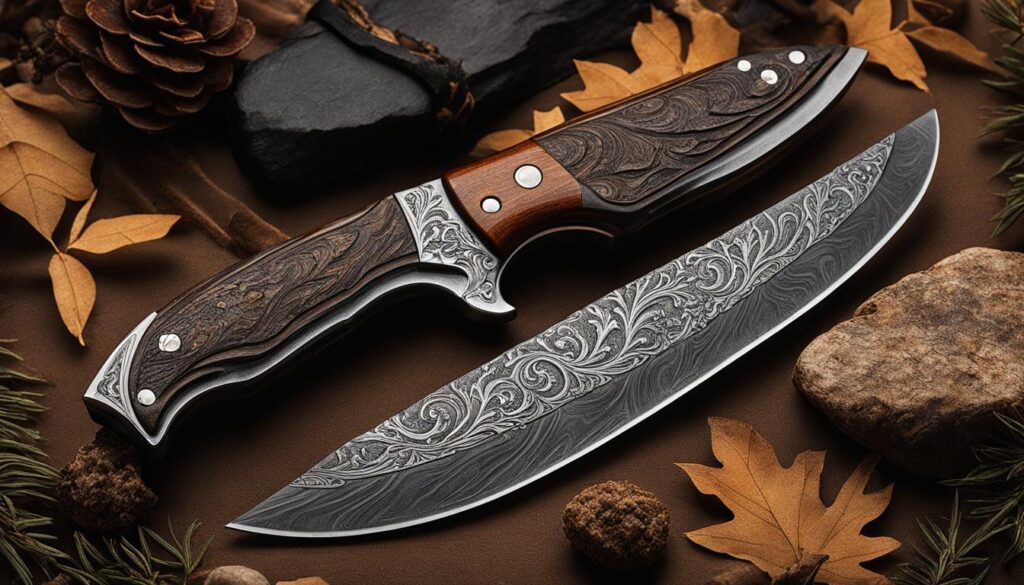

Once the blade is clean and dry, it is recommended to lubricate it with a specialty wax or oil. This will help protect the blade from moisture and prolong its sharpness. Apply a small amount of the lubricant onto a soft cloth and gently rub it onto the blade, taking care to cover the entire surface.
When storing your Damascus hunting knife, it is important to keep it in a dry environment. Ideally, store it in a sheath or case to protect it from dust and scratches. Avoid storing it in a leather sheath, as the tannins in the leather can cause corrosion. Regularly inspect the knife for any signs of damage or wear, and perform any necessary repairs or maintenance as needed.
Essential Care Tips:
- Clean the blade with mild soap and water after each use
- Dry the blade thoroughly to prevent rust
- Lubricate the blade with a specialty wax or oil
- Store the knife in a dry environment, preferably in a sheath or case
- Regularly inspect and perform maintenance as needed
Conclusion
Choosing the right Damascus hunting knife is a crucial decision for any hunting enthusiast. When making your selection, consider the blade style, handle material, and overall quality to ensure you find the perfect knife. Take the time to properly care for your Damascus hunting knife to ensure its longevity and optimal performance.
With its unique wavy pattern, durability, and sharpness, a Damascus hunting knife will be your perfect hunting companion for every season. Its exceptional craftsmanship and premium quality make it a reliable tool that will meet your needs and exceed your expectations.
So, gear up and embark on your hunting adventures with confidence, knowing that you have chosen a premium quality Damascus hunting knife. Its exceptional performance and distinctive design will make your hunting experience even more enjoyable. Invest in a Damascus hunting knife, and let it become an essential part of your hunting gear for years to come.
FAQ
What is Damascus steel?
Damascus steel is a type of steel known for its distinct wavy pattern and valued for its hardness, flexibility, and sharpness.
What are the main types of Damascus steel used in hunting knives?
The main types of Damascus steel used in hunting knives are pattern-welded steel and Wootz Damascus (crucible steel).
How is pattern-welded steel made?
Pattern-welded steel is made by forge-welding two or more different steels together and twisting them to create a unique pattern.
What is Wootz Damascus?
Wootz Damascus is forged from a single ingot and develops a surface “water” pattern after being forged and thermally cycled.
What factors should I consider when choosing a Damascus hunting knife?
When choosing a Damascus hunting knife, consider factors such as blade style, handle material, and overall quality.
How should I care for my Damascus hunting knife?
After each use, clean the blade thoroughly with mild soap and water, dry it completely, lubricate it with specialty wax or oil, and store it in a dry environment.
